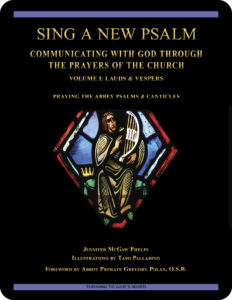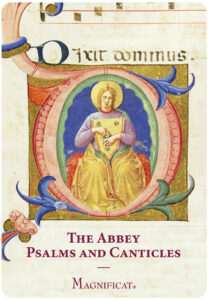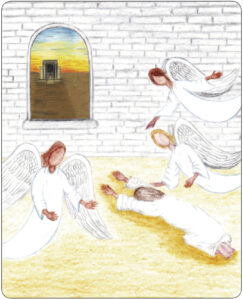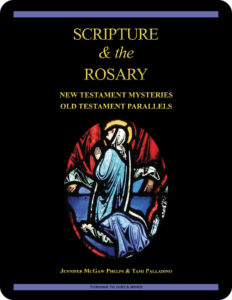 Sing a New Psalm:
Sing a New Psalm:
Communicating with God Through
the Prayers of the Church
Volume I: Lauds & Vespers
Lesson 23 O Give Thanks to the LORD
Psalm 136, Psalm 137, and Psalm 138
Wednesday Vespers (Week II)
Revised Standard Version Catholic Edition (RSVCE)*
New American Bible Revised Edition (NABRE)*
Catechism of the Catholic Church
Rosarium Virginis Mariae (Rosary of the Virgin Mary)
ex libris (in our library)
next lesson: I Will Walk with Blameless Heart
This material coordinates with Lesson 23 on pages 94–97 in Sing a New Psalm: Communicating with God Through the Prayers of the Church—Volume I: Lauds & Vespers. Our Catholic Bible study is based on The Abbey Psalms and Canticles, an English translation of the Psalms prepared by the monks at Conception Abbey in 2010 and first published as The Revised Grail Psalms. The Abbey Psalms and Canticles is a revision of that work, finished in 2020 and published by the United States Conference of Catholic Bishops (USCCB). Wording and numbering of some Psalms and verses in other translations may differ. This new translation of the Psalms in the process of being added to all English-language Liturgy of the Hours books used in the United States. The USCCB also plans a liturgical Bible based on the NABRE translation.
The Abbey Psalms and Canticles, an English translation of the Psalms prepared by the monks at Conception Abbey in 2010 and first published as The Revised Grail Psalms. The Abbey Psalms and Canticles is a revision of that work, finished in 2020 and published by the United States Conference of Catholic Bishops (USCCB). Wording and numbering of some Psalms and verses in other translations may differ. This new translation of the Psalms in the process of being added to all English-language Liturgy of the Hours books used in the United States. The USCCB also plans a liturgical Bible based on the NABRE translation.
“Unlike other prayers in sacred Scripture, the prayers contained in the Psalms are not inserted into a narrative story that specifies their meaning and function. Instead, the Psalms are given to the believer precisely as a text of prayer. Since they are the Word of God, the believer who prays the Psalms speaks to God using the very words that God himself has given to us. Thus, in praying the Psalms we learn to pray. The Psalms are a school of prayer.”—Pope Benedict XVI
welcome to our in-depth study of the Psalms
We invite groups and individuals to check out the sample first lesson from this 28- lesson Turning to
lesson Turning to  God’s Word Catholic Bible study. Our online study pages include additional questions, commentary, and prayers based on the Psalm texts. Sing a New Psalm: Communicating with God Through the Prayers of the Church—Volume I: Lauds & Vespers has been granted an imprimatur. A digital version of this study can be purchased from our website shop. Volume II: Vigils, Day Prayer & Compline is scheduled for publication in 2025. If you have a Bible-study question or comment, click on one of the “ask us your question” or “what do you think” buttons on any online study page.
God’s Word Catholic Bible study. Our online study pages include additional questions, commentary, and prayers based on the Psalm texts. Sing a New Psalm: Communicating with God Through the Prayers of the Church—Volume I: Lauds & Vespers has been granted an imprimatur. A digital version of this study can be purchased from our website shop. Volume II: Vigils, Day Prayer & Compline is scheduled for publication in 2025. If you have a Bible-study question or comment, click on one of the “ask us your question” or “what do you think” buttons on any online study page.
open with prayer
It’s always wise to begin any Bible study with prayer, whether reading the Scriptures alone or meeting with others in a discussion study group. You can pray using your own words, pray one of the Psalms in this lesson, or use one of the opening prayers on our website. We especially like the following:
Lord Jesus, you promised to send your Holy Spirit
to teach us all things.
As we read and study your word today,
allow it to touch our hearts and change our lives. Amen.
when we pray we are putting ourselves in the presence of the angels
This illustration by Turning to God’s Word co-founder Tami Palladino picks up the theme found in Psalm 138— praising God in the presence of the angels. The time of day is sunset, and the same Temple that appears in the illustration for Lesson 7 One Thing I Ask of the LORD on page 31 in Sing a New Psalm: Communicating with God Through the Prayers of the Church—Volume I: Lauds & Vespers, can be seen through a window where the angels are praying. It’s not often that most of us think about the angels being present when we pray. Some older Catholic Churches have ceiling vaults decorated with paintings of angels, reflecting the belief that angels are with us whenever we approach God. In what ways do you think that being aware of the presence of angels when you pray might help you to achieve a better relationship with God? Click on Tami’s illustration (right) to enlarge it. Her original illustration is on page 95 in Sing a New Psalm: Communicating with God Through the Prayers of the Church—Volume I: Lauds & Vespers.
praising God in the presence of the angels. The time of day is sunset, and the same Temple that appears in the illustration for Lesson 7 One Thing I Ask of the LORD on page 31 in Sing a New Psalm: Communicating with God Through the Prayers of the Church—Volume I: Lauds & Vespers, can be seen through a window where the angels are praying. It’s not often that most of us think about the angels being present when we pray. Some older Catholic Churches have ceiling vaults decorated with paintings of angels, reflecting the belief that angels are with us whenever we approach God. In what ways do you think that being aware of the presence of angels when you pray might help you to achieve a better relationship with God? Click on Tami’s illustration (right) to enlarge it. Her original illustration is on page 95 in Sing a New Psalm: Communicating with God Through the Prayers of the Church—Volume I: Lauds & Vespers.
what does it mean to give thanks?
 Many Catholics are familiar with the connection between thanksgiving and the sacrament of the Eucharist. What’s less familiar is the practical value of thanking God, which Jesus demonstrates in chapter six in the Gospel According to John. This topic is examined in considerable detail in Lesson 7 A Lad with Five Barley Loaves in the Turning to God’s Word Catholic Bible study The Gospel According to John: An Encounter with Grace & Truth. A number of participants in
Many Catholics are familiar with the connection between thanksgiving and the sacrament of the Eucharist. What’s less familiar is the practical value of thanking God, which Jesus demonstrates in chapter six in the Gospel According to John. This topic is examined in considerable detail in Lesson 7 A Lad with Five Barley Loaves in the Turning to God’s Word Catholic Bible study The Gospel According to John: An Encounter with Grace & Truth. A number of participants in  our Bible studies have found the video that accompanies that lesson especially enlightening. You can access the video on the online study page.
our Bible studies have found the video that accompanies that lesson especially enlightening. You can access the video on the online study page.
WHAT DO YOU THINK about mercy?
“Mercy” on page 94 in Sing a New Psalm: Communicating with God Through the Prayers of the Church—Volume I: Lauds & Vespers examines the Psalmist’s idea of God’s mercy as the basis for an eternal covenant relationship of faithfulness, loyalty, love, and compassion. For more information about the etymology of the word mercy and how it relates to divine mercy, visit our Lost in Translation archives.
 ? What can you do to increase faithfulness, loyalty, love, and compassion in your life?
? What can you do to increase faithfulness, loyalty, love, and compassion in your life?
? Consider how developing such virtuous qualities can lead to an increase in mercy.
? For what behavior or attitudes do you need to implore God’s mercy?
? Who are some people in your life who may need you to be more merciful?
? What’s one way that you can begin to adopt a more merciful approach to strangers?
? What’s one way that you can begin to show more mercy to those who are close to you?
? In what ways is the Church empowered to help?
dealing with a difficult prayer
Psalm 137 poses a disturbing idea that challenges our beliefs about the need to show mercy to others. It’s not the only Psalm that flies in the face of what we know to be Christian behavior. How can we reconcile these words of Scripture with our understanding of God’s mercy? One way to think about such violent prayers is to consider them as the Psalmist’s way of venting his frustration safely to God. Many of us have close friends or relatives with whom we feel comfortable saying things we never would wish to hear repeated in a public forum. We tell our friends how we feel when we’ve been hurt or wronged by another. Although we often express hostile feelings, we rarely intend to act on them. Expressing our feelings is a way of venting. We tell a trusted friend how we feel, and after that we’re able to let go of some of our hostility and move forward with new room in our hearts for love and forgiveness. One of the ultimate messages we can take away from Psalm 137 and others like it is that it’s OK to share our negative feelings with God in the same way we might share such feelings with any friend who knows us well enough to understand that we don’t mean every hostile thing we say. As Christians our goal is to put hostile feelings behind us. To do this, sometimes we first need to admit what it is that we’re feeling.
the popes inspire us—more about mercy
The following inspirational words about mercy come to us courtesy of Terry Fenwick, who’s associated with  our St. Mark Bible study group in the San Francisco Bay Area. These words are part of an interview with Pope Francis published in La Civilta Cattolica.
our St. Mark Bible study group in the San Francisco Bay Area. These words are part of an interview with Pope Francis published in La Civilta Cattolica.
“The ministers of the Church must be ministers of mercy above all. The confessor, for example, always is in danger of being either too much of a rigorist or too lax. Neither is merciful because neither really takes responsibility for the person. The rigorist washes his hands so he leaves it to the commandments. The loose minister washes his hands by simply saying, ‘This is not a sin,’ or something like that. In pastoral ministry we must accompany people, and we must heal their wounds.”
 the popes inspire us—life is a pilgrimage to find God
the popes inspire us—life is a pilgrimage to find God
Take a few minutes to read the short commentary “Yearning for Jerusalem” on page 96 in Sing a New Psalm: Communicating with God Through the Prayers of the Church—Volume I: Lauds & Vespers. In it, Pope Benedict XVI shares the words of St. Augustine of Hippo, who wrote about honoring those committed to peace even if they don’t share our faith. St. Augustine taught that we can learn from these steadfast people how to persevere on our journey to God.
 seraphim—you could look it up in our archives
seraphim—you could look it up in our archives
Do you know the difference between “angels” and “seraphim” based on the Greek from which their names derive? To learn how to distinguish between these two words, you can read Lost in Translation, an online column in which Turning to God’s Word author Matthew Phelps helps readers connect with ideas expressed in the original languages of the Scriptures. New Lost in Translation entries are posted on Mondays, and past entries are archived on our website. Contact us if you’d like to receive Lost in Translation by email every week.
the best Catholic commentary about Scripture
 To find out more about how Church teaching is supported by passages in Sing a New Psalm: Communicating with God Through the Prayers of the Church—Volume I: Lauds & Vespers, check out the Index of Citations in the Catechism of the Catholic Church. Links (Revised Standard Version Catholic Edition [RSVCE*]) to the primary Scripture passages in the lesson and relevant paragraphs in the Catechism are provided here. Not every passage in the biblical text for this study is referenced in a Catechism paragraph, however, including Psalm 136 and Psalm 137 in this lesson.
To find out more about how Church teaching is supported by passages in Sing a New Psalm: Communicating with God Through the Prayers of the Church—Volume I: Lauds & Vespers, check out the Index of Citations in the Catechism of the Catholic Church. Links (Revised Standard Version Catholic Edition [RSVCE*]) to the primary Scripture passages in the lesson and relevant paragraphs in the Catechism are provided here. Not every passage in the biblical text for this study is referenced in a Catechism paragraph, however, including Psalm 136 and Psalm 137 in this lesson.
Psalm 138:1–8—paragraph 304
Psalm 138:2—paragraph 214
don’t forget about our indexes & extra online material

 If you’re trying to locate information about a specific Scripture passage, you can look it up in the index at the back of the study book or sample lesson. If you want to find a particular commentary, you can look up its title in the topics index. To learn more about another book of the Bible for which there’s a Turning to God’s Word study, visit the online study directories to read the commentaries and watch any accompanying videos. Finally, if you have a question or would like to make a comment about any of our studies, you can use one of the “ask us your question” or “what do you think” buttons to email our authors.
If you’re trying to locate information about a specific Scripture passage, you can look it up in the index at the back of the study book or sample lesson. If you want to find a particular commentary, you can look up its title in the topics index. To learn more about another book of the Bible for which there’s a Turning to God’s Word study, visit the online study directories to read the commentaries and watch any accompanying videos. Finally, if you have a question or would like to make a comment about any of our studies, you can use one of the “ask us your question” or “what do you think” buttons to email our authors.
ex libris—Church documents & books about religious topics
Link to magisterial documents referred to in our Bible studies at ex libris—magisterial documents.  This listing includes significant recent encyclicals as well as a number of historical Church documents. Recommended books related to Scripture study can be found at ex libris—main bookshelf.
This listing includes significant recent encyclicals as well as a number of historical Church documents. Recommended books related to Scripture study can be found at ex libris—main bookshelf.
wondering how to pronounce some of these words?
The following links are to readings from the New International Version (NIV) Bible. To listen, open one of the links and click on the audio icon above the printed text. Although not taken from the translations used in our study materials, the NIV readings provide an audio guide to pronunciation of words in this lesson’s primary biblical texts. A close online version of the translation of the Bible used in Catholic liturgy in the United States as well as an audio guide for daily Mass readings for the current month can be found on the website of the United States Conference of Catholic Bishops (USCCB).
Psalm 136 (NIV)
Psalm 137 (NIV)
Psalm 138 (NIV)
 close with a Psalms-based prayer for Wednesday Vespers (Week II)
close with a Psalms-based prayer for Wednesday Vespers (Week II)
Many of our Catholic study groups like to conclude their discussions with a prayer based on the scriptural focus of their lesson. If you’re uncomfortable composing your own Bible-based prayers, you can follow our four easy steps. If you prefer, you can pray any of the Psalms in this lesson, or you can use the following short prayer.
O God of eternal mercy,
you teach us to respond with gratitude and thanksgiving
to the many ways in which you demonstrate your love for us.
Help us always to show mercy and kindness to others.
We ask this in the name of your Son, Jesus Christ,
whose unlimited capacity for merciful love
has opened for us the door to eternal life. Amen.
Lesson 24 I Will Walk with Blameless Heart, Thursday Lauds (Week II)—Psalm 101, Psalm 143, and Psalm 147:1–11
Lesson 22 Teach Us to Number Our Days, Wednesday Lauds (Week II)—Psalm 90, Psalm 98, and Psalm 99
you also may like our study of Scripture & the Rosary (digital only)
 Scripture & the Rosary: New Testament Mysteries, Old Testament Parallels, a 26-lesson Catholic Bible study with an imprimatur, looks at the biblical foundations of the Rosary. The study includes lessons on Pope St. John Paul II’s Rosarium Virginis Mariae (Rosary of the Virgin Mary), the Apostles’ Creed, and the Luminous Mysteries as well as the original 15 Mysteries of the Rosary. Color photographs of stained glass windows depict key scenes in the lives of Jesus and Mary. Free digital lessons rotate throughout the year on our website.
Scripture & the Rosary: New Testament Mysteries, Old Testament Parallels, a 26-lesson Catholic Bible study with an imprimatur, looks at the biblical foundations of the Rosary. The study includes lessons on Pope St. John Paul II’s Rosarium Virginis Mariae (Rosary of the Virgin Mary), the Apostles’ Creed, and the Luminous Mysteries as well as the original 15 Mysteries of the Rosary. Color photographs of stained glass windows depict key scenes in the lives of Jesus and Mary. Free digital lessons rotate throughout the year on our website.
start a Turning to God’s Word Bible study
Thank you for your interest in Sing a New Psalm: Communicating with God Through the Prayers of the Church—Volume I: Lauds & Vespers. 
 More information about beginning a Turning to God’s Word Bible study can be found on this website at start a Bible study, and Tami, Matthew, and I are available to answer questions or discuss concerns. Contact us to start this or one of our other studies or to have your schedule listed with other TtGW study groups on our website. —Jennifer
More information about beginning a Turning to God’s Word Bible study can be found on this website at start a Bible study, and Tami, Matthew, and I are available to answer questions or discuss concerns. Contact us to start this or one of our other studies or to have your schedule listed with other TtGW study groups on our website. —Jennifer
*There are seven deuterocanonical books in the Old Testament—the Books of Tobit, Judith, Wisdom, Sirach, Baruch, and First and Second Maccabees, as well as some passages in the Books of Esther and Daniel. Protestants usually refer to these works as “apocryphal,” a word that means “outside the (Protestant) canon” because they’re excluded from most Protestant Bibles. The word “deuterocanonical” means “second canon”; Catholics use that word to refer to any section of the Catholic Old Testament for which there are no extant, or existing, Hebrew manuscripts. All of the deuterocanonical books appear in the Septuagint, the earliest remaining versions of which date to the 1st century B.C. This Greek translation of the Old Testament was in common use by Jews at the time of Jesus—but the same books aren’t found in existing Hebrew manuscripts, which aren’t as old as the oldest version of the Septuagint. Learn more by reading How Do Catholic & Protestant Bibles Differ?
Turning to God’s Word printed Bible studies use the 2006 Revised Standard Version Second Catholic Edition (RSV2CE) translation for all Scripture references except the Psalms, which are taken from The Abbey Psalms and Canticles, prepared by the monks of Conception Abbey and published in 2020 by the United States Conference of Catholic Bishops (USCCB). All Scripture links for the online study pages for Sing a New Psalm: Communicating with God Through the Prayers of the Church—Volume I: Lauds & Vespers are to the 1966 Revised Standard Version Catholic Edition (RSVCE) translation. The New International Version (NIV) audio recordings follow the same chapter and verse numbering as the RSV Catholic translations, but the NIV doesn’t include the deuterocanonical passages.
The 1966 RSVCE uses archaic pronouns and verb forms such as “thee,” “thou,” “didst” in the Psalms and in direct quotations attributed to God. The 2006 RSV2CE replaces these with more accessible English. The few significant translation changes in the RSV2CE include rendering almah as “virgin” in the Book of Isaiah 7:14 and restoring the term “begotten” in the Gospel According to John 3:16.
The Psalms in this Bible study reflect numbering used in The Abbey Psalms and Canticles; Psalms numbering may vary in other translations. Numbering also may vary for a few other passages in this Bible study. Turning to God’s Word studies follow the numbering in the Revised Standard Version Catholic translations (RSVCE and RSV2CE). Discrepancies in the New American Bible Revised Edition (NABRE) are noted in the Index of Scripture Citations in the study book and the online sample.
 The companion to this Catholic Bible study from Turning to God’s Word, Sing a New Psalm: Communicating with God Through the Prayers of the Church—Volume II: Vigils, Day Prayer & Compline, will cover Psalms not included in Volume I: Lauds & Vespers. Volume II: Vigils, Day Prayer & Compline is scheduled for publication in 2025.
The companion to this Catholic Bible study from Turning to God’s Word, Sing a New Psalm: Communicating with God Through the Prayers of the Church—Volume II: Vigils, Day Prayer & Compline, will cover Psalms not included in Volume I: Lauds & Vespers. Volume II: Vigils, Day Prayer & Compline is scheduled for publication in 2025.
